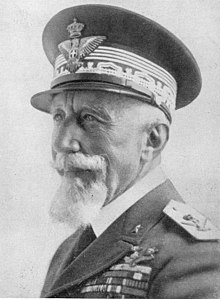
Back Emilio De Bono Afrikaans Emilio De Bono ALS إميليو دي بونو Arabic Эміліа Дэ Бона Byelorussian Емилио Де Боно Bulgarian Emilio de Bono Catalan Emilio De Bono Czech Emilio De Bono German Εμίλιο Ντε Μπόνο Greek Emilio De Bono Esperanto
Emilio De Bono | |
|---|---|
 De Bono in 1937 | |
| Minister of the Colonies | |
| In office 12 September 1929 – 17 January 1935 | |
| Monarch | Victor Emmanuel III |
| Preceded by | Benito Mussolini (act.) |
| Succeeded by | Benito Mussolini (act.) |
| Governor of Eritrea | |
| In office 18 January 1935 – 22 November 1935 | |
| Preceded by | Ottone Gabeli (act.) |
| Succeeded by | Pietro Badoglio |
| Governor of Tripolitania | |
| In office 3 July 1925 – 18 December 1928 | |
| Preceded by | Giuseppe Volpi |
| Succeeded by | Pietro Badoglio |
| Member of the Senate of the Kingdom | |
| In office 1 March 1923 – 5 August 1943 | |
| Appointed by | Victor Emmanuel III |
| Personal details | |
| Born | 19 March 1866 Cassano d'Adda, Lombardia, Italy |
| Died | 11 January 1944 (aged 77) Verona, Veneto, Italian Social Republic |
| Cause of death | Execution by firing squad |
| Political party | National Fascist Party |
| Alma mater | Scuola Militare Teulié Military Academy of Modena |
| Cabinet | Mussolini |
| Military service | |
| Allegiance | |
| Branch/service | |
| Years of service | 1884–1920; 1935–1943 |
| Rank | Marshal of Italy |
| Commands | Blackshirts |
| Battles/wars | Italo-Ethiopian War of 1887–1889 Italo-Turkish War World War I Second Italo-Ethiopian War World War II |
Emilio De Bono (19 March 1866 – 11 January 1944) was an Italian general, fascist activist, marshal, war criminal, and member of the Fascist Grand Council (Gran Consiglio del Fascismo). De Bono fought in the Italo-Turkish War, the First World War and the Second Italo-Abyssinian War. He was one of the key figures behind Italy's anti-partisan policies in Libya, such as the use of poison gas and concentration camps, which resulted in the deaths of tens of thousands of civilians and have been described as genocidal.[1]
After voting for the ousting of Benito Mussolini, De Bono and five others were arrested and tried for treason at the Verona trial. All of the men were found guilty, with De Bono and four others being executed by firing squad the following day.
- ^ John Gooch: Re-conquest and Suppression: Fascist Italy's Pacification of Libya and Ethiopia, 1922–39. In: Journal of Strategic Studies, Band 28, Nr. 6, 2005, S. 1005–1032, hier S. 1009; Aram Mattioli: Experimentierfeld der Gewalt. Der Abessinienkrieg und seine internationale Bedeutung 1935–1941. Zürich 2005, S. 42–45.